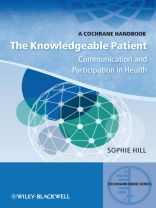Learn how to place communication and participation at the heart of evidence-based healthcare
The Knowledgeable Patient: Communication and Participation in Health sits at the forefront of the challenging, changing 21st century landscape. The ‘knowledgeable patient’ as an individual can take many forms: patient, family carer, consumer advocate, or member of the public interested in health issues. In each of these roles, knowledgeable patients interact with health professionals by asking questions about the evidence for treatment, seeking support, exchanging views, and contributing experiences and new ideas on how to improve the health system.
Drawing from several research paradigms, The Knowledgeable Patient is an essential guide to a new era of complex healthcare. Integrating consumer stories and evidence from systematic reviews, it examines key communication and participation issues in a range of contexts, including:
* surgery
* safe medicine use
* chronic disease self management
* the complexity of multimorbidity
* notification of rare disease risk.
The Knowledgeable Patient is international in scope with researched examples spanning living in the community, health service treatment, governance, and policy making. It provides health professionals with new ideas, concepts, evidence, and practical tools to understand the central role of communication and participation to a well-functioning health system. It is an ideal reference for undergraduate and postgraduate students studying the health sciences.
Watch a video about The Knowledgeable Patient: Communication and Participation in Health from the author, Sophie Hill: bit.ly/x NYCq G
Table des matières
List of contributors, vii
Preface, ix
Acknowledgements, xii
Chapter 1 Does communication with consumers and carers
need to improve? 1
Megan Prictor and Sophie Hill
Chapter 2 A new conceptual framework for advancing
evidence-informed communication and participation, 12
Sophie Hill and Mary Draper
Chapter 3 Interventions for communication and
participation: their purpose and practice, 27
Sophie Hill, Dianne B. Lowe and Rebecca E. Ryan
Chapter 4 Identifying outcomes of importance to
communication and participation, 40
Sophie Hill, Dianne B. Lowe and Joanne E. Mc Kenzie
Chapter 5 Communicating risk and risk statistics for
preventing chronic disease, 54
Sophie Hill, Adrian G.K. Edwards and Dianne B. Lowe
Chapter 6 What does participation mean? Reshaping our
understanding of the meaning of surgery, 67
Sophie Hill and Jessica Kaufman
Chapter 7 Disclosure: a case study of communication about
medically acquired risk for a rare disease, 82
Rebecca E. Ryan, Jessica Kaufman and Sophie Hill
Chapter 8 How I used a systematic review from The
Cochrane Library, 94
Helen Dilkes, Jessica Kaufman and Sophie Hill
Chapter 9 Evidence and resources for systems
decision-making: improving the experience of health and treatment,
105
Dianne B. Lowe, Sophie Hill and Rebecca E. Ryan
Chapter 10 Looking at online health information more
critically, 115
John Kis-Rigo
Chapter 11 Learning to communicate, 125
Megan Prictor, Simon Lewin, Brian Mc Kinstry and Jessica
Kaufman
Chapter 12 Getting the most out of research: using what
we know, 143
Dell Horey, Jessica Kaufman, Sophie Hill
Chapter 13 Research agendas for knowledgeable patients,
151
Ruth Stewart and Sandy Oliver
Chapter 14 Managing multiple health problems: is there
evidence to support consumer-focused communication and
participation? 161
Rebecca E. Ryan and Sophie Hill
Chapter 15 Partners in care – an evidence-informed
approach to improving communication with women in a hospital
setting, 173
Sophie Hill, Maureen Johnson and Mary Draper
Chapter 16 Building health-literate societies, 184
Sophie Hill, Dianne B. Lowe, Chaojie Liu and Nancy
Santesso
Chapter 17 Tools for building research capacity and
knowledge transfer, 196
Helen Dilkes, Jessica Kaufman and Sophie Hill
Chapter 18 Emerging technologies for health
communication, 208
Yannis Pappas and Josip Car
Index 218
A propos de l’auteur
Sophie Hill, MA, Ph D, Coordinating Editor, Cochrane Consumers and Communication Review Group, Head, Centre for Health Communication and Participation, Australian Institute for Primary Care and Ageing, La Trobe University, Victoria, Australia












